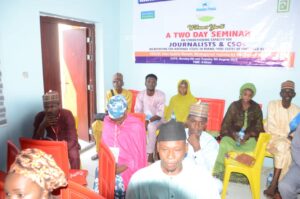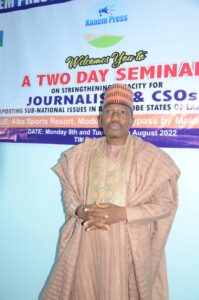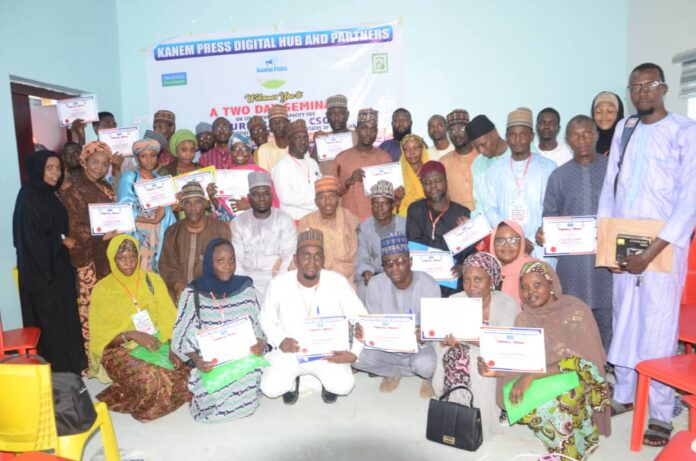Kanem Press, partners to train journalists, CSOs on reporting insurgency-ravaged Lake Chad region
Kanem Press Digital Hub and stakeholders on the rehabilitation of insurgency-ravaged Lake Chad Region of North Eastern Nigeria have organised a two-day seminar in Maiduguri to strengthen the capacity of journalists and Civil Society Organisations (CSOs) in reporting sub- national issues within the Lake Chad region of Borno and Yobe States in North East Nigeria.
The seminar also urged journalists and Civil Society Organisations, to create synergy between themselves in order to come up with solutions to the challenges of the area.
The stakeholders stressed that the panacea of community based advocacy on development should be holistic for citizens to recognise the importance of cooperation between civil society organisations and government units.

Delivering his opening remarks at the workshop, the president/founder Kanempress Digital Hub and Partners, Zanna Ibrahim Mustapha, said it became necessary to empower grassroots journalists with contemporary reportorial skills to be able to bring unreported and under-reported issues and the resilience at the subnational levels.
Mustapha acknowledged the importance of enlightening the journalists on the need to focus on the plight of the North East region which has been ravaged by the prolong existence of insurgence in the Lake Chad Region, with a hope of bringing panacea to all sectors of the economy by keeping them accountable.

In their separate presentations, scholars at the workshop extensively discussed the implications of Lake Chad shrinking from 25000 to 3000 square kilometres, curriculum implementation and analysis into education system of Borno and Yobe States.
Presenting the first lecture, Professor Muhammed Waziri, who gave a brief history of the Lake Chad Region dwelt on the challenges facing water level of the lake as it also gave highlights of the kingdoms and dynasties within the region that also encompassed Borno and Yobe States.
The presentation detailed the region’s land mass citing it as one of the largest in Nigeria, Borno state population, ethnic groups/dialects, tourism sites of the shores of lake chad, Gwoza hills, Mandara mountain, invasion of Rabi, Sambisa game reserve, agro and cattle exports and solid minerals deposits.
The challenges of national and international politics affecting the exploration of the solid minerals were also key areas of his presentation. He described Nigeria as second to none and Borno as one of the states blessed with an abundance of mineral resources.
The second speaker was Dr Habib Muhammad Abba whose presentation focuses on the comprehensive analysis, challenges of curriculum implementation in primary and secondary schools in Borno and Yobe States.
The main point of his presentation was the understanding the difference between education and literacy, lack of humanity due to improper education, translation of written curriculum into the classrooms practices, subjects, leaner and problems solving/centred styles of curriculum and also the extend of curriculum implementation in Borno and Yobe.
Also speaking, Dr Hayatuddeen Muhammad Adam, discussed how to strengthen the partnership between media and civil society organisations and made strong emphasis on the need to fully understand what community development is all about, advocacy and the creation of mission statement.
He also dwelt on the need for multi stakeholder’s alliance or civil society organisations and media partnership, drawing the attention of journalists and CSOs to community development practices.
Dr Babakura Mamman Gadai, a social justice advocate in his lecture provided a comprehensive analysis of education system in Borno and Yobe States, explaining its objectives and philosophies, the role of journalists in the educational system and implementations. He further highlighted issues and challenges of the system, especially displacement, massive destruction of schools infrastructure to an estimated number of about 1500 schools within the North East, as well as the interventions by development partners and government intervention programmes.
Another resource person, Dr Bukar Waziri Zanna, whose presentation covered the cause of poor public service delivery, poor monitoring and evaluation and low level of accountability and transparency provided the strategies for improving public services delivery at sub-national level.
Similarly, Dr Haruna Ayuba from the Department of Political Science, Centre for Peace and Diplomatic Studies, University of Maiduguri, emphasized that journalists and CSOs have a significant role to play in investigative reporting at the sub-national level and the nation at large.
Ayuba noted that leadership frictions were major phenomena affecting the Lake Chad, while providing the remedies to the menace he said commitments on accountability and determination among others are a way of achieving the desired goals.
At the end of the seminar, five syndicate groups were formed and raised some critical questions to brainstorm for better understanding and for further on-line conversations. Some of the participants expressed appreciation to the Kanem Press and partners for the workshop and the resource persons for imparting the required knowledge in them assuring to make good use of what they learnt effectively.
Kanem Press Digital Hub is a media related non-governmental organisation dedicated to carrying out awareness campaigns for journalists and civil society organisations to report issues affecting their immediate environments, with a view to proffering solutions.
The seminar was organised in three phases to build capacity of journalists and civil society organisations in Borno and Yobe States to reflect on government’s level of transparency and accountability to the people.
The Seminar was funded by the McArthur Foundation through the Wole Soyinka Centre for Investigative Journalism (WSCIJ) under a project called the (CMEDIA) ‘Collaborative Media Engagement for Development Inclusivity and Accountability.’
Follow the Neptune Prime channel on WhatsApp: https://whatsapp.com/channel/0029Va74ZvU2v1IqKByXoX3d
Do you have breaking news, interview request, opinion, suggestion, or want your event covered? Email us at neptuneprime2233@gmail.com


